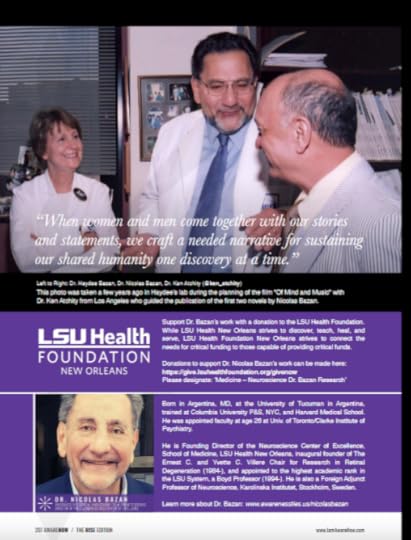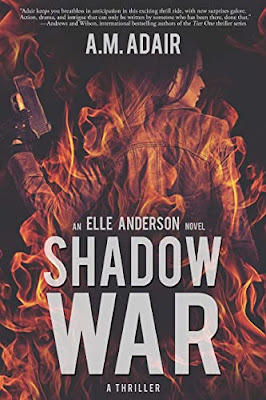Kenneth Atchity's Blog, page 48
April 18, 2022
Being Bazan Spotlight Series: 'The Ally'
Dr. Nicolas Bazan during the planning of the film "Of Mind and Music" with Dr. Ken Atchity who guided the publication of Dr. Bazan's first two novels.

From Being Bazan Spotlight Series: 'The Ally'
Featuring 'Women of Excellence in Science'
https://awarenow.us/bazan/the-ally
Spotlight featuring "Women on Excellence in Science" a group of selected woman scientists trained by Dr. Bazan.
April 15, 2022
Get 1 on 1 Coaching On Your Written Work

Improve Your:
- Story Structure
- Character Arc
- Dialogue Flow
- Marketability of Your Concept
Take Your First Steps Towards Reaching Your Writer’s Potential Today: https://lnkd.in/gUmYG2RY
April 13, 2022
Great Review of A.M. Adair's Shadow Game
April 11, 2022
Ukraine
“How lovely is the strain
Of mingled joy and pain;
It cuts deep in the breast
And cleaves the heart in twain.”
— Lesia Ukrainka (1871-1913), Forest Song

April 8, 2022
Story Merchant Books is proud to announce the third installment in the acclaimed Elle Anderson Series, Shadow War, written by distinguished author A.M. Adair
SHADOW WAR, THE THIRD INSTALLMENT IN THE ELLE ANDERSON SERIES
FROM US NAVY AUTHOR A.M. ADAIR
 The highly anticipated and gripping follow-up to The Deeper Shadow reunites readers with CIA Operative Elle Anderson on the run after being set up by her former handler turned criminal mastermind. Elle must be smarter, faster, and more lethal to stay alive long enough to turn the tables on her enemy, all the while evading teams on both sides of the law. This means using any means necessary to destroy the man pulling the strings. There are no rules in the shadows. This game is driven by will. Nothing is going to stop Elle from finishing her war. The end justifies the means… and the end is here.
The highly anticipated and gripping follow-up to The Deeper Shadow reunites readers with CIA Operative Elle Anderson on the run after being set up by her former handler turned criminal mastermind. Elle must be smarter, faster, and more lethal to stay alive long enough to turn the tables on her enemy, all the while evading teams on both sides of the law. This means using any means necessary to destroy the man pulling the strings. There are no rules in the shadows. This game is driven by will. Nothing is going to stop Elle from finishing her war. The end justifies the means… and the end is here.
Author A. M. Adair is an active-duty Chief Warrant Officer in the United States Navy with over 20 years in the Intelligence Community. Her experiences have been unique and provided her imagination with a wealth of material to draw from to give her stories life. A lifelong fan of the genre, her debut novel, Shadow Game, is the first book in The Elle Anderson Series, and was turned into a graphic novel in January 2022. Book two, The Deeper Shadow, was released in November 2020, and the explosive third installment, Shadow War, is coming March 2022. Autographed copies of her books, and news available on amadair.com.
“Adair keeps you breathless in anticipation in this exciting thrill ride, with new surprises galore. Action, drama, and political intrigue that can only be written by someone who has been there, done that.”
— Andrews and Wilson, international bestselling authors of the Tier One, Sons of Valor, and The Shepherds thriller series, as well as, Rogue Asset, their first installment in the WEB Griffin Presidential Agent Series.

Shadow War by A.M. Adair is available on Amazon
April 6, 2022
The Book Commentary Five Star Review of Ian Bull's The Danger Game

Available on Amazon
The Danger Game by Ian Bull is the third and final entry in the Quintana Adventures, a thrilling tale that functions well as a standalone novel as it does as an explosive conclusion to an engaging series. The Danger Game has become one of the most popular storytelling apps, adored and played by millions. The app features Julia Travers and her fiancé, Stephen Quintana, who play roles in a series on the app where their fictional selves are trapped in a dangerous situation. With over 100 million downloads, the app allows readers to submit entries with the hope that their ideas become part of the exciting “perform or die” series. Unbeknownst to many viewers, the couple has actually been kidnapped and the kidnappers have an insidious plan to kill them in the last episode and get away with a huge fortune. The only hope of saving Steven and Julia are two friends, Carl Webb and Trishelle Hobbes, but they have no clue where the couple is held captive. With the help of one of the best cyber operatives in the US, they create a plan to unravel the mystery surrounding the kidnapping. The stakes grow higher with every passing minute.
Fans of teeth-gnashing action will enjoy The Danger Game, a perfectly plotted and twisty tale that has strong and resonant themes and one that contemporary readers will adore. The intersection between the virtual world and reality is written with an unusual flourish. Ian Bull’s novel is imaginative and it brims with surprising twists, a real tour de force for readers who enjoy stories that depict the world they are in contact with. Each emotional burst, each nerve-jerking twist, and every action is delivered with breathtaking poignancy. This thrilling reality-meets-fantasy adventure moves briskly, with tense and evocative scenes. It is a nuanced tale with sophisticated characters and sub-worlds that are as fascinating and as real as the one that excites the imagination of readers. Throughout, Bull mesmerizes with his beautiful prose, keeping readers captivated by the vivid descriptions and the exciting dialogues, and creating characters that are lovable.
April 1, 2022
Author Spotlight: A.M. Adair
The game is over, now. It's war. In the shadows you can't see the line between good and evil. When this war is over -- what side will CIA operative Elle Anderson finder herself standing on?
Get the entire series by A.M. Adair today and find out!

ON AMAZON

March 25, 2022
My Obit: Daddy Holding Me by Kenneth Atchity

My Obit: Daddy Holding Me a page-turner filled with poignant family experiences, explosive sibling rivalry, literary adventures, ethnic cooking, wide-ranging storytelling, the workings of the brain itself--and what can be learned about life from playing tennis for decades.
"I’ve lived a lifetime of literary adventures by refusing to be relegated to a niche. In My Obit: Daddy Holding Me, my storytelling passion and family and professional anecdotes provide humor and insight into my hugely self-determined life."
~ Ken Atchity
Advanced Praise for My Obit: Daddy Holding Me:
“Powerful. Honest. Heartwarming. A courageous examination of the secret nooks in the soul that expose to the self who we truly are… and why. Atchity’s memoir is riveting, reflective, and revealing. A MUST read!” – Tracy Price-Thompson, bestselling novelist
“My Obit: Daddy Holding Me by Kenneth Atchity is a compelling autobiography worthy of the analogy of Sisyphus discovering the burdens and pleasures of each push of the rock up the hill of his extraordinary life.” – Norman Stephens, producer, former head of Warner Brothers television.
March 23, 2022
Story Merchant Books is pleased to announce our next Zoom Book Launch Party!
On the day of the event, you will be emailed with the Zoom link and Password. Register here!

On Amazon

Getting Your Story Straight: Intensity Chart

Professional coaching tips to help you figure out point of view, structure, and master all the elements of story. Learn more: http://www.thewriterslifeline.com/




